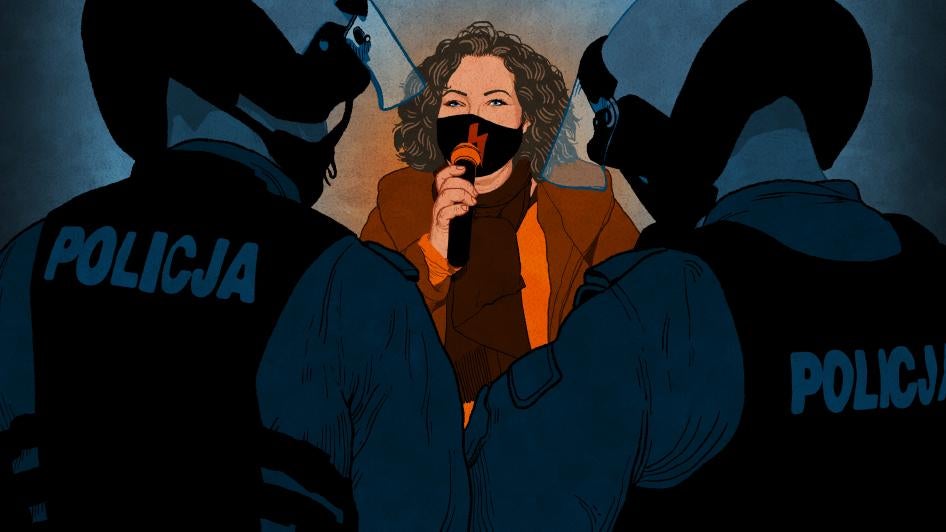It’s been two years since hundreds of thousands of people – mostly women – joined protests in Poland against a near-total ban on legal abortion. Police used violence to disperse rallies and detained thousands of protesters.
On Monday, protesters in Warsaw, at the Constitutional Tribunal, plan to mark the second anniversary of the tribunal’s ruling with another rally, outside the Constitutional Tribunal, which approved the near-total ban. They say they will repeat their demands on the government to decriminalise terminations and to ensure access to safe and legal abortion for all.
They also plan to commemorate several pregnant women known to have died in Poland since the tribunal’s ruling, after doctors refused to give them abortions. One death resulted in criminal charges against the doctors.
The Polish authorities should heed the protesters’ demands and stop repressing the reproductive rights movement. They should ensure that police respect the right to peaceful protest and do not use disproportionate force. They should drop vexatious charges against protesters, and discipline or punish security officers who abuse protesters’ rights.
The European Union can play a key role too, by insisting on such reforms.
Police violence against protesters
During intermittent rallies across the country, from the tribunal ruling on 22 October 2020 into 2021 when the ruling took effect, police dispersed demonstrators with batons, pepper spray and tear gas.
Government authorities said the protesters were defying a pandemic-related ban on gatherings – although the police ‘kettled’ them into cordoned-off areas for hours, which only increased the risk of spreading COVID-19.
Activists, protesters and lawyers countered that the authorities were targeting critics of the government, which has been led by the Law and Justice Party since 2015. Since coming to power, the government has also curbed sex education, denounced LGBTQ+ rights, attacked women’s rights activists and eroded the rule of law.
Protesters described being “hit in the face”, “hit with a truncheon” and “kicked in the groin” by police, in some cases after being pinned to the ground, according to a damning 2021 report from Poland’s independent torture prevention body.
The police also hauled handcuffed protesters from Warsaw to police stations up to 130km away on an “unprecedented scale”, even though at least five police lockups in the capital had space for them, according to the anti-torture unit. In April 2021, Adam Bodnar, then Poland’s human rights commissioner, accused the authorities of transferring the detainees “to hinder contact with lawyers”.
The independent report also said that police laughed at a detained protester with epilepsy who was having difficulty breathing. They choked, punched and kicked another protester and used homophobic slurs and threats against him. In several cases, the police reportedly denied or delayed access to medical care or counsel for detained protesters, and ordered apparently unnecessary strip searches.
Marta Puczynska of the Szpila Collective, which provides legal aid to protesters, told me that a few thousand protesters were charged, about half of them for violating the pandemic-related ban on large gatherings. Most charges were for minor infractions and were dismissed. But Puczynska said several dozen protesters are still awaiting trial for offences that carry prison terms.
Those charged with being an “epidemiological threat” – an offence punishable by eight years in prison – include Marta Lempart, co-founder of the All-Poland Women’s Strike (Ogólnopolski Strajk Kobiet) protest group. A judge dismissed the case against Lempart on technical grounds, but prosecutors reinstated it in September, Lempart told me. It is one of 80 pending cases against Lempart — not only for her involvement in pro-abortion protests but for pro-democracy ones, too. She says the accusations are politically motivated.
Meanwhile, most cases against government forces for abusing protesters are stalled or have been dropped, according to protesters’ lawyers. For example, in 2021, the Warsaw prosecutor’s office dismissed a criminal case against a member of Poland’s internal security agency who was accused of driving his car into a demonstration in October 2020, injuring two women.
During public health emergencies, international law allows governments to restrict certain rights to protect the public. But such restrictions must always meet the requirements of legality, necessity and proportionality, including the use of force and on peaceful assembly.
Near-total ban on abortion
The anti-abortion ruling was made by came from the country’s politically compromised Constitutional Tribunal, which held that abortion because of “severe and irreversible foetal defect or incurable illness that threatens the foetus’s life” was unconstitutional. The tribunal approved the abortion rollback after the executive branch had failed to push it through parliament.
The tribunal’s decision eliminated one of the very few remaining legal grounds for abortion in Poland. Now, although two-thirds of Poles support the right to abortion, the law forbids the procedure unless pregnancy threatens the pregnant person’s life or health, or is the result of rape or incest.
Even in such cases, significant barriers remain. The requirement to show proof of rape makes it almost impossible for rape survivors to obtain abortions, including people who have fled the war in neighbouring Ukraine, reproductive rights activists told me. (Sexual violence by armed groups in wartime is a war crime.)
Many medical professionals also refuse to provide abortions, including on grounds of conscientious objection – in some cases, when a women’s life has been at risk.
The role of the EU
The Polish government should take genuine steps to reform its politically compromised judiciary, which was instrumental in rolling back abortion rights. The European Commission, the EU’s executive arm, can help by standing firm on its position that the Polish government must relinquish executive power over judges to receive tens of billions of euros in grants and loans.
Poland’s government approved some judiciary reforms in June, but independent judges and rights defenders have denounced the changes as superficial.
The EU should also insist that Poland – and all member states – uphold the right to comprehensive sexual and reproductive health care as part of their fundamental rights obligations.
Without an independent judiciary to ward against potential police abuses, the right to peacefully protest for the right to safe abortion access will remain elusive at best. And more pregnant people will suffer the consequences.









